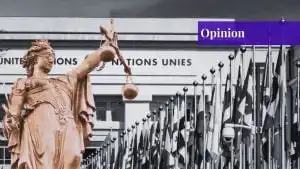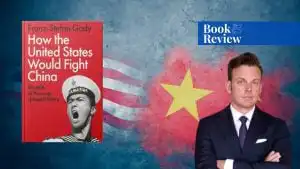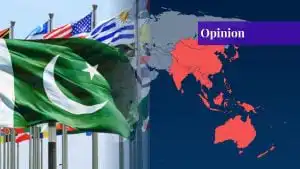Pakistan and a World in Disorder — A Grand Strategy for the Twenty-first Century is a profound and compelling read authored by Javid Husain, a career diplomat, former ambassador, and a former permanent representative of Pakistan to the Economic Cooperation Organization (ECO). The book comprises 11 chapters, with each chapter covering a different aspect of the 21st century that, according to the author, are significant determinants of Pakistan’s foreign policy.
According to the author, Pakistan’s foreign policy has always been out of sync because the policy has not been in line with the changing regional and global dynamics. One of the primary reasons behind Pakistan’s foreign policy being ‘out of sync’ is the constant power tussle and lack of coordination among the different key stakeholders, ministries, and departments concerned with Pakistan’s foreign policy.
Pakistan’s establishment has always wanted Pakistan’s foreign policy to be security-oriented, but only a functional, well-thought-out, and coherent strategy, which the author has proposed as a ‘grand strategy’ has the potential to revive Pakistan’s foreign policy in world politics.
Pakistan and a World in Disorder impeccably not only fills the literature gap but also a significant theoretical gap that exists in analyzing the connection of Pakistan’s foreign policy with the contemporary political changes of the 21st century. When it comes to the foreign policy of Pakistan, a significant literature gap persists. This book profoundly fills that literature gap by providing a comprehensive analysis and understanding of the connection of Pakistan’s foreign policy with contemporary political changes.
The author is more inclined towards pursuing a foreign policy based on the ‘liberal principles’ by stating that national interests must be achieved via the route of cooperation. According to the author, the principles of political harmony, economic prosperity, and cultural identity are to be practiced to keep up with the changing regional and global realities. The author also suggests that Pakistan must pursue its national interest by establishing cooperative and mutual ties and relationships with the neighboring states, Islamic countries, and world powers, particularly China.
The author has time and again emphasized the need for economic acceleration and economic development of Pakistan vis-à-vis India. Cooperation is the remedy suggested by the author for Pakistan to deal with India on equal terms over Kashmir and to get rid of the Indian-led isolation of Pakistan.
The need for a paradigm shift from geo-strategic to geo-economic is significant for Pakistan. Therefore, the grand strategy suggested by the author emphasizes the need for economic growth and acceleration for Pakistan. The author builds his case for the need for a grand strategy by emphasizing that Pakistan cannot achieve its national interests if it keeps on turning a blind eye to the national, regional, and global challenges.
The first chapter of the book begins with an overview of the historical challenges and failures of Pakistan on the foreign policy front as evidence to support his argument that Pakistan’s foreign policy is skewed and ‘out of sync’. According to the author, Pakistan’s foreign policy requires major rethinking and a fundamental review.
The events of 9/11 and the separation of East Pakistan are specified to draw the attention of the policymakers for a major rethinking and framing of a grand strategy. The history of Pakistan’s foreign policy offers substantial lessons for the policymakers to develop a long-term policy instead of adopting the day-to-day approach concerning developing the foreign policy of Pakistan.
The second chapter sheds light on the prominent aspects of the international system and world order which are termed by the author as disorder. The changing polarity (from unipolarity to multipolarity with the emergence of the economic power of China and the assertive power of Russia) and the anarchic international system are significant for Pakistan to form a grand strategy to accomplish its foreign policy goals.
Two of the most debated post-Cold War theories of international relations—the clash of civilizations and the end of history—are being discussed at length in the second chapter of the book. The author highlights the notion of ‘realpolitik’ after the Cold War, where the idealistic principles of equality of states, fair play, justice, and peace remained largely unfulfilled. The stronger kept on pursuing expansionist policies and surviving at the expense of the weaker states.
The United States blatantly disregarded the principles of international law; the invasion of Iraq is a prime example of the expansionist and realist policies of the US. The United Nations miserably failed to deliver on its promise of ensuring fair play, justice, and peace among the states.
The third chapter highlights the rise of China as a major regional power. According to the author, Pakistan needs to further strengthen its economic ties with China to augment its regional connectivity and economic growth. China’s rise has its repercussions, merits, and demerits for Pakistan and is therefore relevant to Pakistani policymakers. To counter India’s hegemonic aspirations, increased economic, strategic, and military cooperation with China is vital for Pakistan.
The hegemonic aspirations of India to dominate the region of South Asia and its impacts on Pakistan are discussed at length in the third chapter of the book. India’s ascent has consequences for the politics, security, and economy of Pakistan which is seen by the author as a potential threat to Pakistan that can impact the regional dynamics. India-centric foreign policy is in the best interests of Pakistan and therefore must be made an inherent part of the grand strategy.
The remedy to counter India’s rise is to strengthen ties with neighboring states, particularly China. Prioritize the economic policies and de-escalate the Kashmir issue until Pakistan becomes economically stable. The author seems pessimistic about the improvement of Pakistan-India relations by affirming that cooperation between the two countries is impossible.
The fifth chapter mainly focuses on the merits and demerits of the two major economic forums such as the South Asian Association for Regional Cooperation (SAARC) and the Economic Cooperation Organization (ECO), as a policy option for Pakistan. The author is more inclined towards utilizing the option of ECO considering the cultural and historical history of Pakistan with ECO countries as compared to SAARC.
According to the author, ECO countries have much to offer to Pakistan and Pakistan, therefore, needs to form close ties with ECO. Afghanistan’s role in world politics in the aftermath of America’s withdrawal is discussed in detail in chapter six of the book. Peace and stability in Afghanistan are significant for peace and security in Pakistan and the region. Close cooperation with the key stakeholders in Afghanistan and better coordination with the states involved is important for Pakistani policymakers. Pakistan needs to keep supporting the initiative of security, economy, and peace in Afghanistan.
Chapter seven of the book encompasses the sorry state of Iran-Pakistan relations over the last few decades. According to the author, the events of the Iranian Islamic revolution of 1979, and the diverging interest and lack of coordination in Afghan policy further worsened the already fragile Pak-Iran relations. Pakistan needs to form good economic ties with Iran under the forum Economic Cooperation Organization (ECO).
Islamophobia, one of the prominent challenges of the 21st century for Pakistan, is discussed in the eighth chapter of Pakistan and a World in Disorder. According to the author, only the extremist side of Islam has been propagated by focusing on particular events to destroy the image of Islam. The periods of peace are conveniently neglected. In Pakistan, where the majority of the population is Muslim, an accurate propagation of Islam as a peaceful religion and portrayal of the positive image of Pakistan is significant for Pakistan’s policymakers.
The ninth chapter of the book is all about the historical mistakes and fault lines of Pakistan’s foreign policy. There lie profound lessons for us in the mistakes made in the history of the foreign policy of Pakistan. The mistakes made in the past must be avoided by adopting a coherent and well-thought-out strategy. The ideological character of Pakistan can’t be ignored owing to its significant rationale for its independence of Pakistan. It can’t be neglected in the present world as left-wing Pakistan has constantly made efforts to deprive Pakistan of its ideological character.
In the last chapter, Javid Husain makes the case for securing Pakistan’s national interests by adopting a well-thought and comprehensive grand strategy. Pakistan can no longer continue with a security-oriented foreign policy while neglecting all the important aspects of foreign policy.
The connection between the foreign policy of Pakistan and the contemporary changing dynamics has been neglected by the scholarship in Pakistan. This book covers all the important dimensions required to develop a workable foreign policy that includes the national, regional, and global factors. The language in the book is easily comprehendible due to the use of simple vocabulary and understandable terminologies.
This book does not merely focus on the present but also considers the historical references so that there is a coherent connection between the past, present, and the future. There are lessons for Pakistan in the history of Pakistan’s foreign policy and the grand strategy will not work out in the long run if the history is neglected. One of the plus points of the book is that it is argumentatively comprehensive i.e., the author has not merely stated his point of view; rather, he has also stated the point of the other party involved.
The author served as a former Ambassador of Pakistan to China and hence has a tilt and is more inclined toward China which makes him biased. Pakistan can’t simply rely on China, without putting its own house in order. Along with countless advantages that China has to offer to Pakistan, there are also certain disadvantages. To stand in the comity of nations, strengthened democracy and technological advancements are the prerequisites.
Pakistan and a World in Disorder time and again emphasizes the regional and global changes to highlight the power of politics and disorder at the global level. Pakistan needs to act accordingly, and the grand strategy must consider the advantages and the disadvantages that can determine Pakistan’s relative power capability in the wake of the changing global order.
If you want to submit your articles and/or research papers, please check the Submissions page.
The views and opinions expressed in this article/paper are the author’s own and do not necessarily reflect the editorial position of Paradigm Shift.
Mr Riaz Ahmed Kakar is a dedicated student currently pursuing a Bachelor's degree in International Relationsf from the National Defense University in Islamabad.






